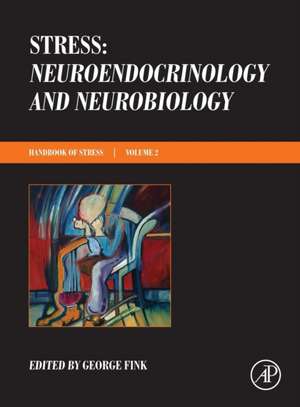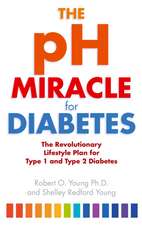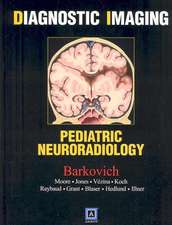Stress: Neuroendocrinology and Neurobiology: Handbook of Stress Series, Volume 2
Editat de George Finken Limba Engleză Hardback – 10 ian 2017
The book features the topic of epigenetics, and how it enables stress and other external factors to affect genetic transmission and expression without changes in DNA sequence. Integrated closely with new behavioral findings and relevance to human disorders, the concepts and data in this volume offer the reader cutting-edge information on the neuroendocrinology of stress.
Volume 2 is of prime interest to neuroscientists, clinicians, researchers, academics, and graduate students in neuroendocrinology, neuroscience, biomedicine, endocrinology, psychology, psychiatry, and in some areas of the social sciences, including stress and its management in the workplace.
- Includes chapters that offer impressive scope with topics addressing the neuroendocrinology and endocrinology of stress
- Presents articles carefully selected by eminent stress researchers and prepared by contributors that represent outstanding scholarship in the field
- Richly illustrated, with explanatory figures and tables
| Toate formatele și edițiile | Preț | Express |
|---|---|---|
| Hardback (3) | 696.35 lei 36-50 zile | |
| ELSEVIER SCIENCE – 10 ian 2017 | 696.35 lei 36-50 zile | |
| ELSEVIER SCIENCE – apr 2016 | 740.30 lei 36-50 zile | +199.07 lei 5-11 zile |
| ELSEVIER SCIENCE – 18 ian 2019 | 813.07 lei 36-50 zile |
Preț: 696.35 lei
Preț vechi: 871.11 lei
-20% Nou
Puncte Express: 1045
Preț estimativ în valută:
133.24€ • 139.49$ • 110.25£
133.24€ • 139.49$ • 110.25£
Carte tipărită la comandă
Livrare economică 31 martie-14 aprilie
Preluare comenzi: 021 569.72.76
Specificații
ISBN-13: 9780128021750
ISBN-10: 0128021756
Pagini: 460
Ilustrații: 150 illustrations (150 in full color)
Dimensiuni: 216 x 276 x 31 mm
Greutate: 1.5 kg
Editura: ELSEVIER SCIENCE
ISBN-10: 0128021756
Pagini: 460
Ilustrații: 150 illustrations (150 in full color)
Dimensiuni: 216 x 276 x 31 mm
Greutate: 1.5 kg
Editura: ELSEVIER SCIENCE
Cuprins
Part I. Neuroendocrine Control of the Stress Response
1. Stress Neuroendocrinology: Highlights and Controversies
2. Limbic Forebrain Modulation of Neuroendocrine Responses to Emotional Stress
3. Adrenergic Neurons in the CNS
4. Noradrenergic Control of Arousal and Stress
5. Evolution and Phylogeny of the Corticotropin-Releasing Factor Family of Peptides
6. Corticotropin-Releasing Factor and Urocortin Receptors
7. Tracking the Coupling of External Signals to Intracellular Programs Controlling Peptide Synthesis and Release in Hypothalamic Neuroendocrine Neurons
8. Neural Circuitry of Stress, Fear, and Anxiety: Focus on Extended Amygdala Corticotropin-Releasing Factor Systems
9. Vasopressin as a Stress Hormone
10. Adrenocorticotropic Hormone
11. The Role of MicroRNAs in Stress-Induced Psychopathologies
12. Stress Reactions Orchestrate Parasympathetic Functioning and Inflammation Under Diverse Cholinergic Manipulations
13. Early Life Stress- and Sex-Dependent Effects on Hippocampal Neurogenesis
14. Stress, Alcohol and Epigenetic Transmission
15. Stress, Panic, and Central Serotonergic Inhibition
16. Neuroendocrinology of Posttraumatic Stress Disorder: Focus on the HPA Axis
17. Stress and Major Depression: Neuroendocrine and Biopsychosocial Mechanisms
18. Telomeres and Early Life Stress
Part II. Endocrine Systems and Mechanisms in Stress Control
19. Stress, Glucocorticoids, and Brain Development in Rodent Models
20. Aging and Adrenocortical Factors
21. Aldosterone and Mineralocorticoid Receptors
22. Androgen Action and Stress
23. Angiotensin—Encyclopedia of Stress
24. Stress, Angiotensin, and Cognate Receptors
25. Annexin A1
26. Corticotropin-Releasing Factor Receptor Antagonists
27. Antidepressant Actions on Glucocorticoid Receptors
28. Lipids and Lipoproteins
29. Corticosteroid Receptors
30. Glucocorticoid Receptor: Genetics and Epigenetics in Veterans With PTSD
31. Stress Effects on Learning and Memory in Humans
32. Sex Differences in Chronic Stress: Role of Estradiol in Cognitive Resilience
33. Rapid and Slow Effects of Corticosteroid Hormones on Hippocampal Activity
34. 11β-Hydroxysteroid Dehydrogenases
35. Stress, Insulin Resistance, and Type 2 Diabetes
36. Steroid Hydroxylases
37. Manipulating the Brain Corticosteroid Receptor Balance: Focus on Ligands and Modulators
38. Stress and the Central Circadian Clock
39. Nongenomic Effects of Glucocorticoids: Translation From Physiology to Clinic
Part III. Diurnal, Seasonal, and Ultradian Systems
40. Circadian Rhythm Effects on Cardiovascular and Other Stress-Related Events
41. Seasonal Variation in Stress Responses
42. Seasonal Rhythms
43. Ultradian Rhythms
1. Stress Neuroendocrinology: Highlights and Controversies
2. Limbic Forebrain Modulation of Neuroendocrine Responses to Emotional Stress
3. Adrenergic Neurons in the CNS
4. Noradrenergic Control of Arousal and Stress
5. Evolution and Phylogeny of the Corticotropin-Releasing Factor Family of Peptides
6. Corticotropin-Releasing Factor and Urocortin Receptors
7. Tracking the Coupling of External Signals to Intracellular Programs Controlling Peptide Synthesis and Release in Hypothalamic Neuroendocrine Neurons
8. Neural Circuitry of Stress, Fear, and Anxiety: Focus on Extended Amygdala Corticotropin-Releasing Factor Systems
9. Vasopressin as a Stress Hormone
10. Adrenocorticotropic Hormone
11. The Role of MicroRNAs in Stress-Induced Psychopathologies
12. Stress Reactions Orchestrate Parasympathetic Functioning and Inflammation Under Diverse Cholinergic Manipulations
13. Early Life Stress- and Sex-Dependent Effects on Hippocampal Neurogenesis
14. Stress, Alcohol and Epigenetic Transmission
15. Stress, Panic, and Central Serotonergic Inhibition
16. Neuroendocrinology of Posttraumatic Stress Disorder: Focus on the HPA Axis
17. Stress and Major Depression: Neuroendocrine and Biopsychosocial Mechanisms
18. Telomeres and Early Life Stress
Part II. Endocrine Systems and Mechanisms in Stress Control
19. Stress, Glucocorticoids, and Brain Development in Rodent Models
20. Aging and Adrenocortical Factors
21. Aldosterone and Mineralocorticoid Receptors
22. Androgen Action and Stress
23. Angiotensin—Encyclopedia of Stress
24. Stress, Angiotensin, and Cognate Receptors
25. Annexin A1
26. Corticotropin-Releasing Factor Receptor Antagonists
27. Antidepressant Actions on Glucocorticoid Receptors
28. Lipids and Lipoproteins
29. Corticosteroid Receptors
30. Glucocorticoid Receptor: Genetics and Epigenetics in Veterans With PTSD
31. Stress Effects on Learning and Memory in Humans
32. Sex Differences in Chronic Stress: Role of Estradiol in Cognitive Resilience
33. Rapid and Slow Effects of Corticosteroid Hormones on Hippocampal Activity
34. 11β-Hydroxysteroid Dehydrogenases
35. Stress, Insulin Resistance, and Type 2 Diabetes
36. Steroid Hydroxylases
37. Manipulating the Brain Corticosteroid Receptor Balance: Focus on Ligands and Modulators
38. Stress and the Central Circadian Clock
39. Nongenomic Effects of Glucocorticoids: Translation From Physiology to Clinic
Part III. Diurnal, Seasonal, and Ultradian Systems
40. Circadian Rhythm Effects on Cardiovascular and Other Stress-Related Events
41. Seasonal Variation in Stress Responses
42. Seasonal Rhythms
43. Ultradian Rhythms
Recenzii
There are many books on Stress, but [this] covers a much wider variety of interesting topics than most - I'm enjoying reading it. Excellent choice of themes and authors. Good and tight editing. The Key Point boxes are very helpful. Of all the stresses that are described in the book - clearly one will never be a source of stress for [the reader] - Boredom! -- Professor David Copolov, OAM, MBBS, PhD, FRACP, FRANZCP, MPM, DPM, AO, Pro Vice-Chancellor, Major Campuses and Student Engagement, and Professor of Psychiatry, Monash University, Professor of Psychiatry, University of Melbourne and Professorial Fellow, Florey Institute of Neuroscience and Mental Health









